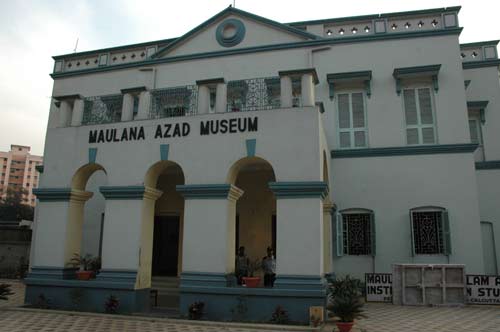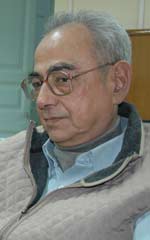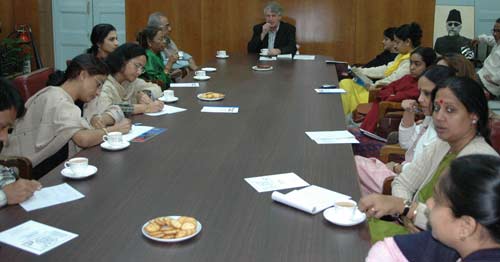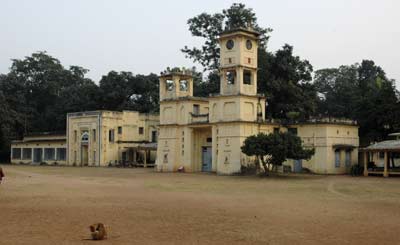SWEDISH SOUTH ASIAN STUDIES NETWORK
Maulana Abul Kalam Azad Institute of Asian Studies (MAKAIAS), Kolkata, Tuesday 3 January 2006
Web page: http://www.makaias.org/. Domain name however expired on Jan 16, 2006.
 Staying
on in Kolkata Lars was invited to visit the prestigious MAKAIAS Institute
in Kolkata on 3 January 2006, to inform the research fellows about SASNET
and possibilities of collaboration with Swedish researchers. A meeting
had been organised by Professsor Jayanta
Kumar Ray, Chairman of MAKAIAS Executive Council, in the brand new
localities of the institute within the imposing mansion once belonging
to the freedom fighter Maulana Abul Kalam Azad (it was in this house at
No.5 Ashraf Mistri Lane in Ballygunge that Maulana Azad and Jawaharlal
Nehru on behalf of the Congress Party drafted the Quit India declaration
in 1942).
Staying
on in Kolkata Lars was invited to visit the prestigious MAKAIAS Institute
in Kolkata on 3 January 2006, to inform the research fellows about SASNET
and possibilities of collaboration with Swedish researchers. A meeting
had been organised by Professsor Jayanta
Kumar Ray, Chairman of MAKAIAS Executive Council, in the brand new
localities of the institute within the imposing mansion once belonging
to the freedom fighter Maulana Abul Kalam Azad (it was in this house at
No.5 Ashraf Mistri Lane in Ballygunge that Maulana Azad and Jawaharlal
Nehru on behalf of the Congress Party drafted the Quit India declaration
in 1942).
MAKAIAS was set up in 1993 at the joint initiative of the Government
of India (Dept. of Culture, Ministry of Human Resource Development) and
the Government of West Bengal. Professor Nurul Hasan, then Governor of
West Bengal, became its first President. The ambition was to create a
centre for research and learning with focus on social, cultural, economic
and political/administrative developments in Asia from the middle of the
19th Century onwards, with special emphasis on their links with India.
Till now the research at MAKAIAS has been much focused on modern and contemporary
affairs in South Asia (especially the Northeast region of India, and Bangladesh),
Central and West Asia (Uzbekistan, Turkmenistan, Tajikistan, Kazakhstan,
Kyrgyzstan, Turkey, Iran, Afghanistan), but the institute has also consciously
worked on widening its area of study to Southeast Asia and China. A large
number of International conferences and workshops have been held over
the years, in Kolkata but also in Delhi, Dhaka, Dushanbe and other Asian
cities. Among such conferences can be mentioned an International workshop
on ”Problems of Governance in the Eastern South Asia Subregion”,
held in Kathmandu in March 2001, and an International seminar on ”International
Terrorism and Religious Extremism: Challenges to Central and South Asia”,
held in New Delhi in January 2003.
Several seminars on specific problems relating to the Indian Northeast have also been jointly organised with local universities and held in places like Darjeeling (West Bengal), Aizawl (Mizoram), Imphal (Manipur), Agartala (Tripura), Shillong (Meghalaya), Kohima (Nagaland), Itanagar (Arunachal Pradesh) and Dibrugarh (Assam). Themes for these workshops include ”Women’s Movement in Manipur in the 20th Century”, ”Reopening of the Stilwell Road: Prospects and Problems”, and ”Continuity and Change in the Naga Society”.
 Prof.
Jayanta Kumar Ray (photo to the right) had invited me to the
institute. He is a legendary person within his field, being Centenary
Professor of International Relations at Calcutta University from 1977
till 2000, and founder of the Centre for South and South-East Asian Studies
in 1978 (and being its Director for 13 years, till 1991). He was closely
involved in the foundation of MAKAIAS in 1993, and since May 2005 he is
Chairman of its Executive Council. Prof. Ray is also President of the
South Asia Research Society, a non-governmental and non-University organization
engaged in a variety of activities ranging from social/natural science
research to eradication of rural poverty. Over the years he has published
a large number of books dealing with different Asian countries, such as
Indonesia, Thailand, Bangladesh and Nepal. His most recent book, edited
along with Prabir De, deals with ”India and China in an Era of Globalisation”
(Bookwell, New Delhi, 2005).
Prof.
Jayanta Kumar Ray (photo to the right) had invited me to the
institute. He is a legendary person within his field, being Centenary
Professor of International Relations at Calcutta University from 1977
till 2000, and founder of the Centre for South and South-East Asian Studies
in 1978 (and being its Director for 13 years, till 1991). He was closely
involved in the foundation of MAKAIAS in 1993, and since May 2005 he is
Chairman of its Executive Council. Prof. Ray is also President of the
South Asia Research Society, a non-governmental and non-University organization
engaged in a variety of activities ranging from social/natural science
research to eradication of rural poverty. Over the years he has published
a large number of books dealing with different Asian countries, such as
Indonesia, Thailand, Bangladesh and Nepal. His most recent book, edited
along with Prabir De, deals with ”India and China in an Era of Globalisation”
(Bookwell, New Delhi, 2005).
The Institute currently has 20 research fellows, but it will soon expand
to 24. The positions are for 2-3 years. On 1 January 2006 Dr. Swapna
Bhattacharya (previously at the Centre for South and South-East Asian
Studies see our report from there)) also joined MAKAIAS to proceed with
her research on Arakan.
Fourteen of the research fellows turned up for my presentation about SASNET,
and they all presented their ongoing research projects, and in interactive
session I was suggesting them about possible colleagues in Sweden with
whom they might collaborate.
 Research
fellows at the meeting:
Research
fellows at the meeting:
• Dr. Amija K Chandhini. Research
fields: Governance and Electoral Politics in West Bengal.
• Sanjana Joshi. East
Asian Studies. India’s North East politics. Role of Japan and China
vs SAFTA.
• Arpita Basu Roy.
Afghanistan’s society and politics. Afghan-Pakistan relations and
its implications for India.
• Sreemati Ganguly.
India, Russia and Central Asia. Russo-Central Asian relations during 1992-2003.
• Priya Singh. Israeli
leadership and negotiations in the context of the Arab-Israeli conflict
1990-2003.
• Anita Sengupta.
Central Asia, esp. Uzbekistan.
• Monika Mandal. South Asia
• Rakhee Bhattacharya.
Developmental issues, like poverty, inequality, human development, regional
and gender disparities.
• Dr. Suchandana
Chatterjee. Eurasian steppes, Siberia and Russian Far East. Earlier
works on Tajikistan, Kazakhstan and Kyrgyzstan.
• Mrinal Kanti Chakma.
Indigenous and tribal people development strategy in North East India.
Autonomy of the indigenous and tribal people.
• Dr. Swarupa Gupta.
Bengali treatment of neighbouring ethnicities: Perspectives on Samaj in
late colonial and contemporary contexts.
• Susmita Bhattacharya.
Russian language programme. Russia, Central Asia and South East Asian
countries.
• Dr. Binoda Kumar Mishra.
International regime formation around security issue areas. Socio-economic
and political condition of indigenous population of Purulia (a tribal
districts of West Bengal).
Visit to Visva-Bharati University, Shantiniketan, Friday 30 December 2005
Web page: http://www.visva-bharati.ac.in/
 After
the official contact journey was over Lars made a private visit to Shantiniketan
in the last week of December 2005. There he revisited the Visva-Bharati
University, founded by Rabindranath Tagore (Staffan and Lars visited the
university during their 2002 contact journey, see http://www.sasnet.lu.se/shantmeet.html)
After
the official contact journey was over Lars made a private visit to Shantiniketan
in the last week of December 2005. There he revisited the Visva-Bharati
University, founded by Rabindranath Tagore (Staffan and Lars visited the
university during their 2002 contact journey, see http://www.sasnet.lu.se/shantmeet.html)
On 30 December a meeting was held with Dr. Amit
Kumar Hazra, Reader in Economics at the Dept. of Social Studies &
Rural Development in Sriniketan, who was our host during the 2002 visit.
Dr. Hazra gave some updated information regarding the university that
now has 6 200 students. Out of these 2 500 are however actually pupils
of the three schools integrated into the university – a feature
that makes Visva-Bharati University particular. Photos from Shantiniketan
often depict students having out-door lessons sitting around their teacher
under big trees in the campus area. These are students of Pata Bhavan,
previously called the Tagore School. Another school is, in accordance
with Tagore’s educational ideals, located in a village outside Shantiniketan,
and the third school is a higher secondary one.
Visva-Bharati is no static institution. Several changes are currently
under way. Dr Hazra’s department for Rural Development has till
now also included anthropological studies, but from 2006 a separate Dept.
of Anthropology is set up. The university has also decided to set up a
Programme for Tagorean Peace Studies, from the Fall 2006.
Another interesting development is an initiative by a US based organisation, the International Institute of Bengal Basin, IIBB, to launch a sister university of Visva-Bharati in Bangladesh. The proposed site for the second Visva-Bharati University is Kishoreganj, near to Bajitpur. Dr. Rash Bihari Ghosh, Chairman of IIBB, argues that it was a great blunder not to have a Tagore University in Bangladesh immediately after independence in 1971 as the younger generations of Bangladesh are unable to acquire the knowledge of invaluable cultural resources that world poet Tagore and other leaders left behind us to improve the quality of life. Dr. Ghosh first proposed this idea to Professor Dilip Sinha (former Vice-Chancellor of Visva Bharati), and he has pursued further Dr. Sujit Basu, present Vice-Chancellor of Visva Bharati University, and the former President of Bangladesh, Dr. Budruduza Choudhury, to take an interest in the idea. Read more about this initiative.
SASNET - Swedish South Asian Studies Network/Lund
University
Address: Scheelevägen 15 D, SE-223 70 Lund, Sweden
Phone: +46 46 222 73 40
Webmaster: Lars Eklund
Last updated
2006-09-28
